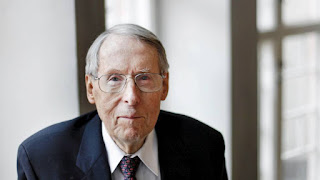The Editors in Chief of Synthese note with sadness the death of Jaakko Hintikka
on August 12, 2015. Hintikka was Synthese’s Editor in Chief for almost 40 years
(1965 – 2002). He was a charismatic and influential editor who left his stamp on the
journal.
Hintikka was a distinguished philosopher and a prolific writer who made important
contributions to analytic philosophy. He published close to 40 books and several hundred
articles. He was a pioneer in the fields of possible-world semantics, epistemic
logic, game-theoretic semantics, branching quantification, IF logic, and more. His
contributions spanned a large number of topics from the philosophies of logic, mathematics,
science, knowledge, and language to the history of philosophy (Aristotle,
Kant, Wittgenstein, and others).
Hintikka was a recipient of the prestigious Rolf Schock prize of the Royal Swedish
Academy of Science in logic and philosophy. Among his seminal books areKnowledge
& Belief (1962), Models for Modalities (1969), Logic, Language-Games & Information
(1973), Investigating Wittgenstein (with Merrill B. Hintikka, 1986), and The
Principles of Mathematics Revisited (1998). He will be sorely missed.
Este blog está creado para compartir, opinar, discutir sobre temas de lógica, lógicas no-clásicas, filosofía de la lógica, filosofía de las matemáticas.
Bienvenidos !!!
Este blog no tiene ninguna otra finalidad que compartir y ayudar a reflexionar sobre lógica y filosofía de la lógica, filosofía de las matemáticas, de la ciencia etc.
El blog es absolutamente gratuito.Es importante difundir nuestras reflexiones, discusiones, investigaciones y logros en el campo de las disciplinas que nos apasionan .
Gracias por seguir el blog !!!
Claudio Conforti
domingo, 27 de septiembre de 2015
lunes, 14 de septiembre de 2015
Lógica, Filosofía de la Lógica: "Logic teaching in the 21st century " by John Corc...
Lógica, Filosofía de la Lógica: "Logic teaching in the 21st century " by John Corc...: 18th International Conference of Logic Teaching (XVIII EIDL, 2015) and the 5th International Symposium for Research in Logic and Argumentat...
"Logic teaching in the 21st century " by John Corcoran
18th International Conference of Logic Teaching (XVIII EIDL, 2015) and the 5th International Symposium for Research in Logic and Argumentation (V SIILA, 2015)
Dear friends, I am pleased to share the abstract of our Inaugural Magistral Lecture:
"Logic teaching in the 21st century " by John Corcoran
JOHN CORCORAN
Philosophy, University at Buffalo Buffalo, NY 14260-4150,
USA E-mail: corcoran@buffalo.edu
Philosophy, University at Buffalo Buffalo, NY 14260-4150,
USA E-mail: corcoran@buffalo.edu
"We are much better equipped to let the facts reveal themselves to us instead of blinding ourselves to them or stubbornly trying to force them into preconceived molds. We no longer embarrass ourselves in front of our students, for example, by insisting that “Some Xs are Y” means the same as “Some X is Y”, and lamely adding “for purposes of logic” whenever there is pushback. Logic teaching in this century can exploit the new spirit of objectivity, humility, clarity, observationalism, contextualism, and pluralism. Besides the new spirit there have been quiet developments in logic and its history and philosophy that could radically improve logic teaching. One rather conspicuous example is that the process of refining logical terminology has reached a critical mass. Future logic students will no longer be burdened by obscure terminology and they will be better able to read, think, talk, and write about logic in a more careful and more rewarding manner. Closely related is increased use and study of variable-enhanced natural language as in “Every proposition x that implies some proposition y that is false also implies some proposition z that is true”. Another welcome development is the culmination of the slow demise of logicism. No longer is the teacher blocked from using examples from arithmetic and algebra fearing that the students had been indoctrinated into thinking that every mathematical truth was a tautology and that every mathematical falsehood was a contradiction. A fourth welcome development is the separation of laws of logic from so-called logical truths, i.e., tautologies. Now we can teach the logical independence of the laws of excluded middle and non-contradiction without fear that students had been indoctrinated into thinking that every logical law was a tautology and that every falsehood of logic was a contradiction. This separation permits the logic teacher to apply logic in the clarification of laws of logic. This lecture expands the above points, which apply equally well in first, second, and third courses, i.e. in “critical thinking”, “deductive logic”, and “symbolic logic”."
We hope to see you there!
November 10th - 13th, 2015
Centro Universitario de Ciencias Sociales y Humanidades, Universidad de Guadalajara, Guadalajara, Jalisco, México.
http://www.academiamexicanadelogica.org/
Centro Universitario de Ciencias Sociales y Humanidades, Universidad de Guadalajara, Guadalajara, Jalisco, México.
http://www.academiamexicanadelogica.org/
Suscribirse a:
Comentarios (Atom)

